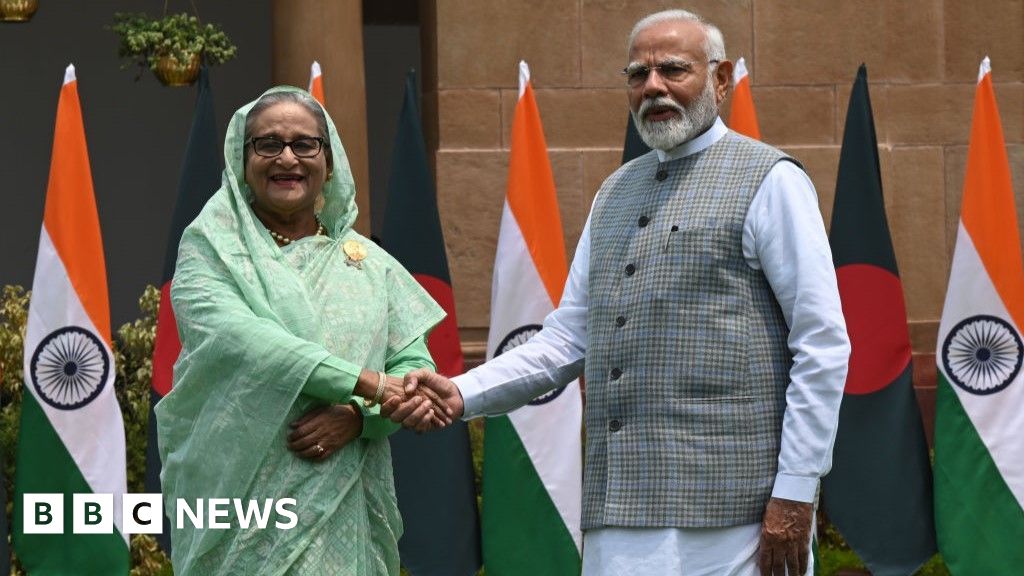'Girls Will Be Girls' review: A sublime coming-of-age tale that deeply understands girlhood
Shuchi Talati's Sundance hit "Girls Will be Girls" is a masterclass in mother-daughter tension in awkward adolescence. Film review.


Girlhood, in all its pain, wonder, and perplexity, is a complicated business to accurately capture on screen. It's so confusing sometimes. Relationships between mothers and daughters during adolescence? Same deal. From Lady Bird to Mermaids, coming-of-age films about girls often explore the awkwardness of early sexual experiences alongside the tense, precarious relationships between girls and their mothers.
The debut feature and Sundance Film Festival hit from Indian writer-director Shuchi Talati, Girls Will Be Girls explores this complex time through understated, intense performances from Preeti Panigrahi and Kani Kusruti, respectfully intimate cinematography and editing, and a minimalist, loaded script. It's a stunning, poignant film that lends agency and inquisitive empowerment to its young protagonist, whose "no bullshit" philosophy brings a fresh perspective to portrayals of adolescence.
It's a period of conflict, anxiety, miscommunication, pressure, and misdirected angst. Don't act like you don't remember.
What is Girls Will Be Girls about?

At the core of the film is 16-year-old Mira (Panigrahi), a studious, determined girl whose burgeoning exploration of sexual desire and first love is thrown into confusing, infuriating disarray by her mother Anila (Kusruti), whose own adolescence wasn't as full of such awakenings.
Set in the 1990s, the film introduces Mari as a model student at her conservative boarding school in the Himalayas. She's head prefect, a stickler for the rules, acing her grades, and pulling up other students on their uniform errors. Teachers even trust her with the school keys. But she's quite a solitary person, favouring studies over friendship. When Mira develops a crush on 17-year-old classmate Sri (Kesav Binoy Kiron), she's resolved to follow her physical impulses — importantly, on her terms. However, her mother's constant presence frustrates her, impeding her yearning for maturity and experience with Sri (and remember, this is the '90s, so they've got no social media to chat after school on, only parental landlines).
But it goes further than pure supervision. Anila's strange closeness and (let's be real) flirtation with Sri triggers Mira's jealousy and unease, driving an awkward, loaded wedge between mother and daughter. With Talati's simmering script in the hands of the film's extraordinarily talented leads, director of photography Jih-E Peng uses elegant cinematography to amplify both the tension and tenderness between them.
Preeti Panigrahi and Kani Kusruti are magnificent

Girls Will Be Girls paints an exquisite portrait of complicated mother-daughter mechanics in the teen years, with exceptional performances from Panigrahi and Kusruti. As Mira, Panigrahi imbues her character with confidence, determination, and an unwavering stare. She privately defies societal expectations of teen girls while operating well within their parameters publicly. Meanwhile, Kusruti conceals a dynamic force of a woman within Anila, one protective of her daughter while seemingly mourning a teen awakening of her own.
Despite the main narrative concerning Mira's coming-of-age, the constant tension between her and Anila proves the heart of the film. Mira covertly attempts to buy time for sexual experimentation with Sri, frustrated by her lack of freedom. Anila, craving attention within her own marriage to Mira's perpetually absent father, begins to strangely compete with her daughter whenever Sri is around. A subtle and deeply resentful battle of access and maturity is weighed between mother and daughter, in which Anila constantly takes up the space Mira yearns for.
The thing is, both Mira and Anila know exactly what each other are doing. Every time. They don't directly say what they're thinking about each other, but anyone who's had a mother-daughter relationship will know those looks. Their charged interactions, edited to perfection by Amrita David, radiate with annoyance, loaded comments, and fierce glaring, not directly acknowledging their issues but making their disdain or defiance clear. Panigrahi and Kusruti's performances range from playfulness to suspicion to suppressed rage, all without ever screaming at each other. It's impeccable, and a different kind of anger than explored in Everything Everywhere All At Once but just as palpable.
Girls Will Be Girls gently explores early sexual experiences without judgment

Amid this tension over space and maturity, Girls Will Be Girls gives Mira ample time to embrace and investigate her sexual awakening, an awkward, relatable journey performed with bold courage by Panigrahi and Kiron, and sensitively handled by Talati, Peng, and David.
A true academic, Mira is determined to explore her newfound desires with all the scrutiny of an exam to study for. She's both fascinated by all of it and self-conscious of Sri's experience. Captured with handheld, intimate close ups and sound design, Mira's exploration feels non-judgmental. Talati doesn't seek to either glorify or vilify, letting the camera simply sit on minuscule moments of analysis, closeness, forgiveness, and betrayal.
In a confident, considerate performance from Kiron, Sri channels a maturity beyond his years, unfussed by Anila's concerns and easily assuaging her. And in a world saturated with teen dramas and coming-of-age films where girls are robbed of their agency, Mira's confidence and Sri's respect for her boundaries are incredibly refreshing.
Girls Will Be Girls demonstrates how boys are protected, girls are blamed
Though it's not the main storyline, one of the persistent realities underlining the film is the double standard of how boys and girls' behaviour is considered within the school environment, a place which fosters misogynistic actions when it should be a vital base for unlearning them. Talati contrasts the strict conservatism of the boarding school — the left-right-left marching orders over the opening credits, wide shots of students standing to attention in perfect order at assembly — with both the burgeoning sexual tension between teenagers and the rampant harassment girls suffer from their male classmates.
Male students' abhorrent behaviour is largely allowed to run by the school while female students are blamed — especially for their skirt length. "Be careful with boys," the girls are instructed by their teacher. "Don't talk to them more than necessary. You're getting older, you need to be careful." Talati wields sound as an important tool here, thanks to sound team Carole Verner, Laure Arto, and Colin Favre-Bulle; boys' whispering is easily audible in the silent classrooms and halls, with only the sound of a camera snapping unmasking the act of upskirting.
When Mira rejects the advances of her classmate, his vengeance is supported not only by his male peers but the school environment itself. Mira is shamed by her teacher as being "inappropriate" for hanging out with Sri. When Mira endures a terrifying experience, she doesn't call the police or the teachers, she calls Alina. It's through Mira's experiences that Girls Will Be Girls shows how vital education institutions are to fighting these systems of oppression. As Rachel Thompson writes for Mashable, "Tackling male violence means fighting misogyny on a societal level. That means educating boys and men about masculinity, gender roles, male entitlement, and their behaviour towards women and girls in all contexts, public or private."
Ultimately, the film isn't a lecture on this, but instead uses showing not telling to make it clear. Girls Will Be Girls manages to gently but authentically explore the complexities of girlhood through excellent performances, a minimalist script that trusts its actors, and superb, close cinematography. It's a tough job, to find unique ways to explore teen sexuality in cinema, but Talati defines a new perspective with a truly mesmerising film.
Girls Will Be Girls hits cinemas in the U.S. Sept. 13 and in the UK and Ireland on Sept. 20.















